Aging gracefully: The Power of Vintage Triathletes
By their commitment and determination, Barker, Gruenfeld and all the older triathletes out there are doing more than keeping a phenomenal level of personal fitness.
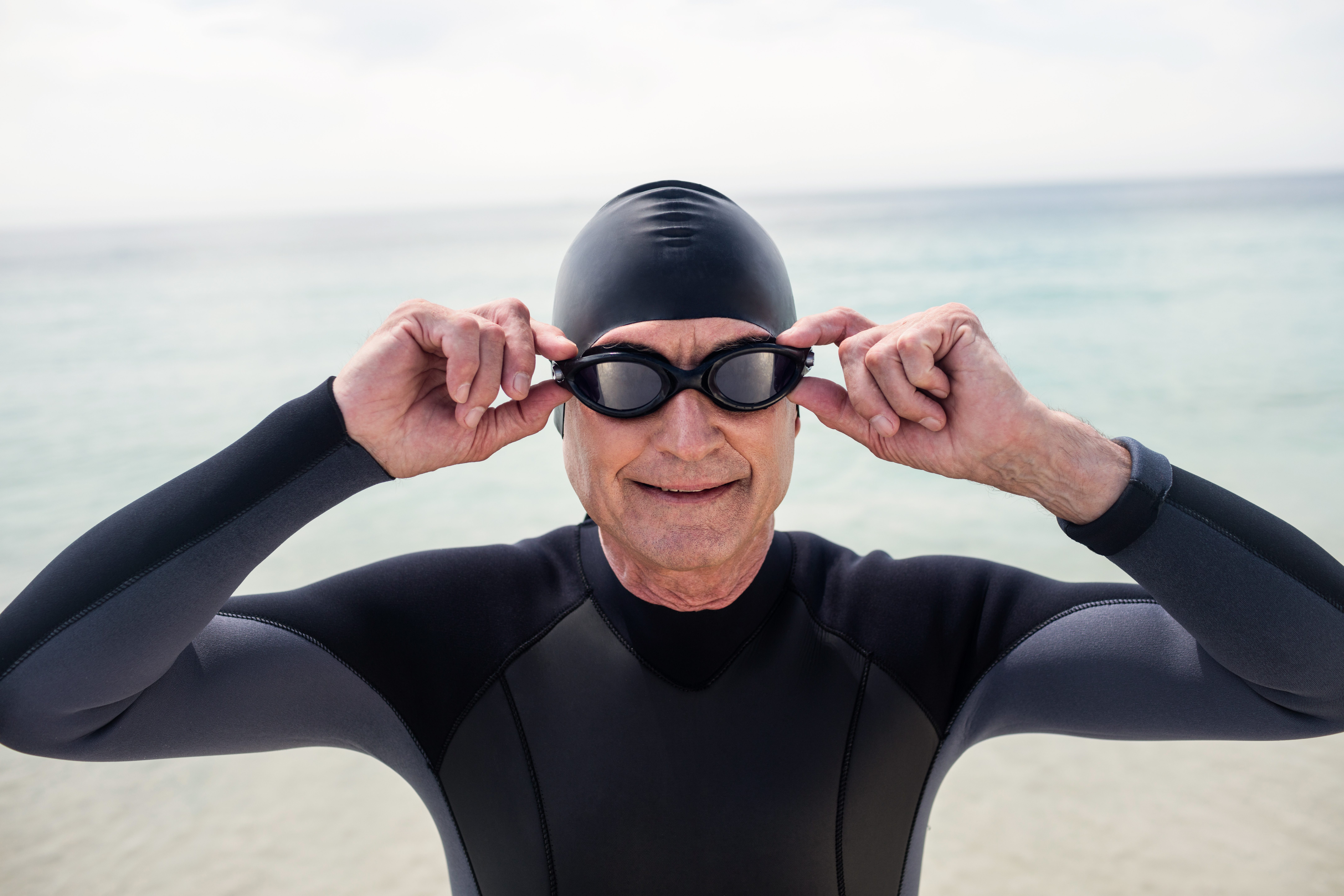
— by Helen Powers
The sport might be tough, but that doesn’t mean that getting older means you need to stop. The demographics of triathlon participants show that more and more older athletes are competing these days. If you think you can ever be too old to compete in a triathlon, it’s time to get with the program and appreciate the achievements of some of the world’s premier older triathletes – especially since you might be one someday.
Californian Cherie Gruenfeld began racing triathlon events at age 48 and quickly developed an impressive resume. She won her age group seven times at the Ironman World Championship in Kailua-Kona and was the first woman over age 55 to break the race’s 12-hour barrier. Now, at age 74, she focuses on 70.3-distance races and is often approached by younger racers with comments about “still being at it.”
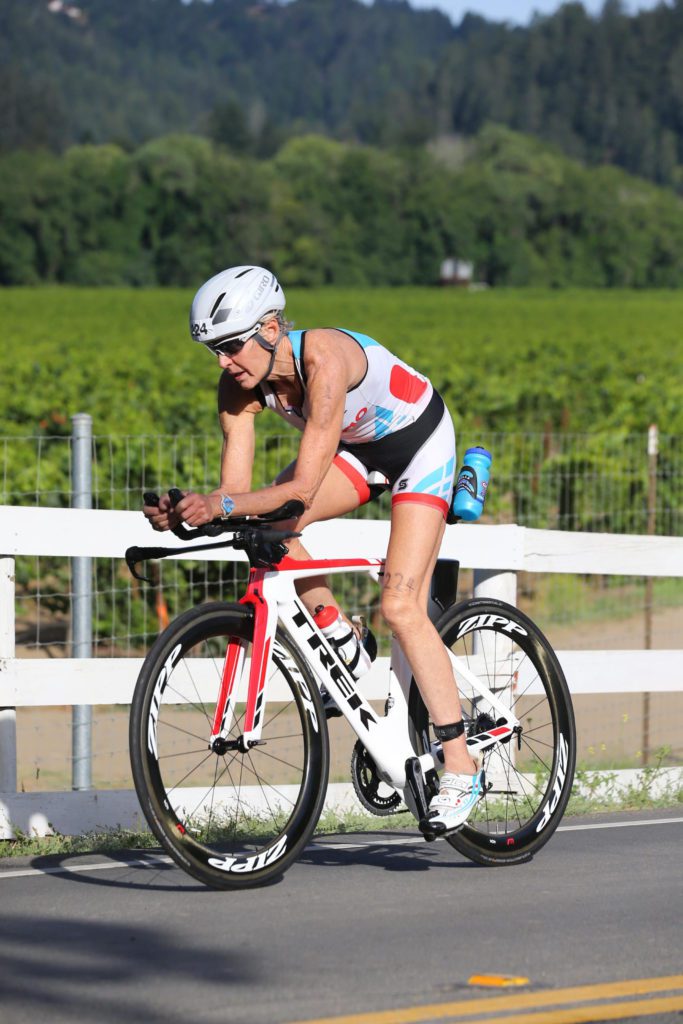
“I love it every time someone says something like that,” she says, “It is a little boost for me.”
Burlington, Ont.’s Roger Barker finished last in his first triathlon in his early 60s, but continued to push himself for better performances over longer distances.
“At the beginning of every year, I set a goal to do something new that’s outside my comfort zone,” Barker says. “It’s great to start something new in your 60s and to see yourself getting better at it.” His first Ironman was in the 60–65 age group, and he’s been to Kona three times, most recently this fall in the 75–79 category.
“Now, the longer the race, the better I seem to do,” says Barker.
These are two of many triathletes who are hoisting the upper limit of age-group categories with a determination to stay fit over the long term. Without in-depth analysis, it is difficult to say how many of these racers are relatively new to the sport, like Barker, and how many have been running through the categories for years, like Gruenfeld.
A quick look at the numbers on Sportstats.ca does indicate a rise in the age-group categories at a number of well-known events. For Olympic races at Guelph Lake in Ontario over the last 15 years, the upper limit of women’s age groups grew from 60 plus in 2003 to 70-74 this year. The men did a similar climb during this time and stretched the top category from age 60–64 up to age 75–79.
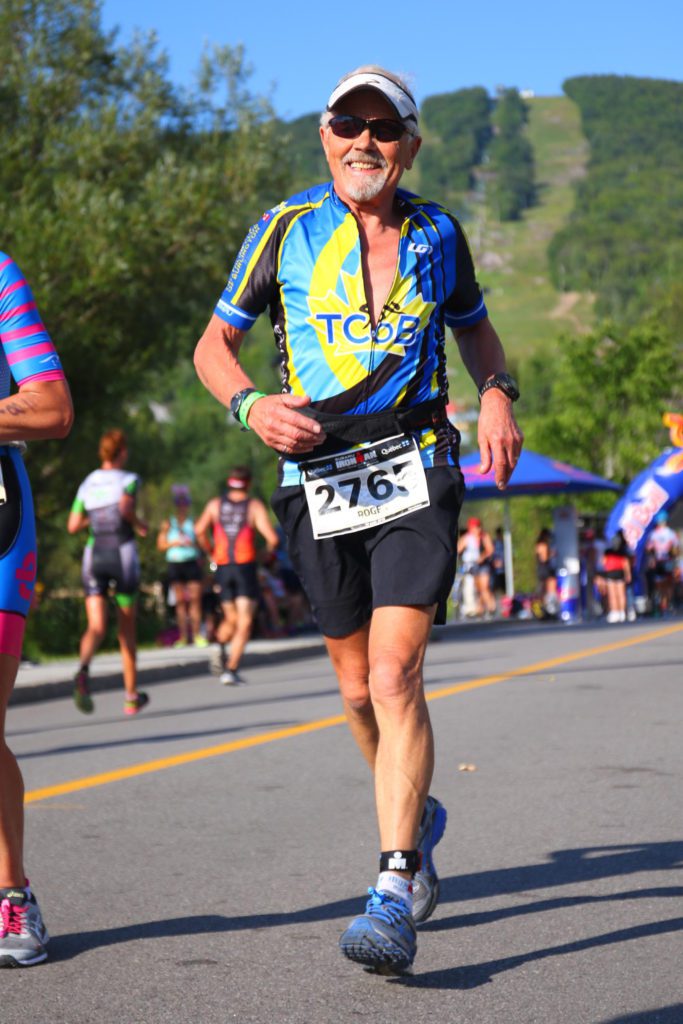
Looking further west at Calgary’s 70.3 Ironman, the age- groupers also expanded the top limit over the last nine years. In 2009, the women’s upper age group was 60–64. This year, the oldest age group was 70–74 in 2018. The men’s age groups changed from a ceiling of 70–74 up to the age category of 75–79.
In addition to the rising ceiling of age groups, a second observation at races is a shift to more participants above the traditionally busy age groups of 34–39 and 40–44. Raymond Britt of RunTri Media analyzed the statistics of entrants from 2011 to 2018 for Ironman Muskoka. He found that, generally, age-group entrants as a percentage of total age-groupers are trending older, but not in a marked way.
It seems as if there are more racers in the older categories at some races. At the iconic Ironman Canada, there was a noticeable difference at the 2003 race compared to the 2018 race. This year, the 50–54 age group had 35 more entrants for the women and 52 more for the men than it did in 2003. And similarly, the 55–59 age group increased by 15 entrants for women and 19 entrants for men.
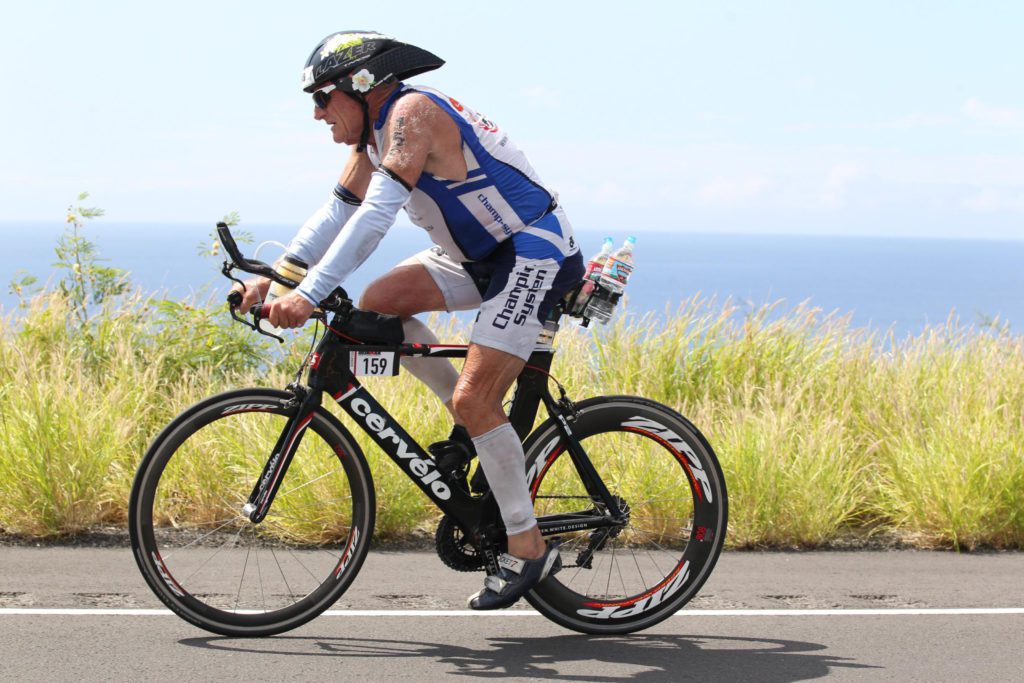
As a coach, Gruenfeld has seen a trend to more involvement by older athletes.
“In past times,” she says, “60 was considered older, but these days we have plenty of racers in their 70s and even 80s. Clearly, more people are continuing to race as they age.”
She feels that older adults may be more involved because they now have more time available and better financial resources for the sport.
Greg Pace, owner of PACEperformance, has coached many people over the age of 40 and believes that having an athletic background makes it easier to start triathlon later.
“Being less athletic in your youth means [you will often have] less adaptability to training and slower progress as you get older,” says Pace. “If you’re over 50 today, triathlon was not a sport when you were young, but if you did other things, that muscle skill and memory stays with you and is never really lost.”
This doesn’t mean it’s easy. Pace mentions that in the 30–34 age group, the peak age for endurance athletes, there is hardly any drop-off at all in muscle mass. But, when you’re between the ages of 75 and 79, there can be a significant amount of muscle wasting, and this is a challenge for older adults if they don’t stay on top of it with exercise.
Barker played many sports before becoming a triathlete, but had never done weights until he trained with Pace.
“The challenge with the maturing body is needing twice as much effort to stay the same, so it is vital to have a strength component in your training,” Pace says. He calls strength training the “fountain of youth,” in part because issues like sore knees may be resolved after a few months.
Starting triathlon later in life can be an advantage, from Pace’s perspective, because you are less likely to have experienced the injuries many young triathletes might have gone through because they overdid it.
Gruenfeld has a similar outlook. “When you’re younger, there is a tendency to overdo it and many don’t last in the sport because they burn out or get injured,” she explains. “When you start later in life, you understand you’re not invincible, and training can take it’s toll, so you tend to train smarter.”
Gruenfeld no longer does tough workouts back to back to back. Instead, she has three key workout days and the others are for recovery. Barker is also quite aware that injuries now take longer to heal and there is a need to listen to your body and take care of it when something hurts or doesn’t feel right.
As athletes get older, Pace feels workouts must be more efficient and favour quality over quantity.
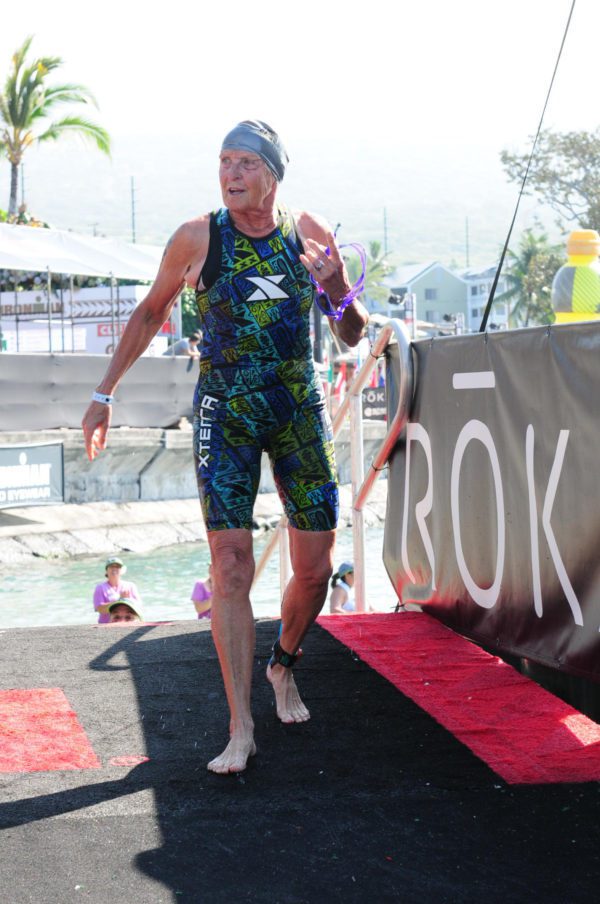
“I see training as a circle,” he says. “In the middle is the balance and around the circle is the stress, the recovery, the adaptation and then starting the sequence all over again.”
“It’s a fine line we walk,” says Gruenfeld. “As you get older, you simply can’t train as you did when you were younger. That said, if you give into the aging process, your performance will surely decline. So instead of giving in to it, if you keep pushing yourself, with high but reasonable expectations, you can still do high-quality work.”
When she started doing Ironman races, Gruenfeld planned to continue as long as she was enjoying it. In 2015, while training in the desert for a full Ironman, she realized the training had become less enjoyable and decided to shift her focus to 70.3 races instead. Over time, she will adjust her triathlon goals as needed to stay with this sport she loves.
Barker, now 75, declared at the beginning the year that this would be his last year for Ironman races because he wants to have more time with his family.
“Ironman is such a huge time commitment,” he says, “but I will continue to do shorter races as long as I am able.” His swim is the slowest part for him, and although he is one of the last out of the water, he really enjoys passing everyone afterward on the bike and the run.
For those older athletes who are wondering about trying triathlon, Barker says they should go for it.
“Everyone is nervous,” he says, “but don’t worry too much about how well you will do, or where you will place. Just enjoy it. I never thought I would qualify for Kona, but eventually, I did.”
By their commitment and determination, Barker, Gruenfeld and all the older triathletes out there are doing more than keeping a phenomenal level of personal fitness. Whether running, biking or swimming, they’re creating ripples of change as everyone around them realizes the new possibilities as they age gracefully.
Helen Powers is a regular contributor to Triathlon Magazine Canada. She lives in Dundas, Ont.
